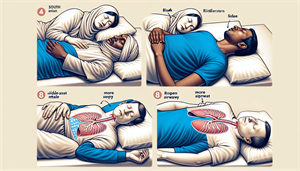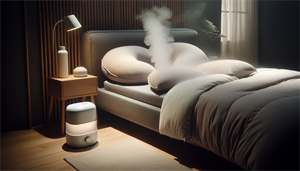Are you curious about the different sounds of snoring each night? The key to quieting them starts with understanding “what are the three types of snoring”: 1) nose-based, 2) mouth-based, and 3) tongue-based.
This article will help you identify which type of snoring is keeping you awake, with insights into their unique causes and how to address them.
Key Takeaways
-
Snoring is categorized into three primary types: nose-based (caused by blockages in nasal passages), mouth-based (resulting from airway tissue vibration due to mouth breathing), and tongue-based (where the relaxed tongue obstructs airflow).
-
Individual snoring types can be identified by evaluating one’s sleep positions, listening to snore sounds, and considering factors like alcohol or medication use, as they can relax throat muscles and worsen snoring.
-
Preventative and intervention strategies for snoring include lifestyle changes such as weight management and quitting smoking, adopting sleep position adjustments, and in severe cases, seeking professional help and considering surgeries or CPAP therapy.
Unraveling the Mysteries of Snoring: A Closer Look

At its core, snoring is a physical process. It’s the sound we make when air flows past relaxed tissues in the upper airway, causing these tissues to vibrate as we breathe. But not all snoring is created equal. There are three primary categories of snoring, each with its unique causes and characteristics: nose-based, mouth-based, and tongue-based snoring.
Discerning the different types of snoring plays a significant role in pinpointing the most effective solutions. For instance, nose-based snoring could be related to blocked nasal passages, while mouth-based and tongue-based snoring may involve different parts of the throat and mouth. We’ll examine each type in greater detail.
Nose-Based Snoring: The Nasal Passage Conundrum
Nasal snoring occurs when there are blockages in the nasal passages. This type of snoring, also known as nose-based snoring, can be caused by allergies, sinus infections, nasal polyps, or a deviated septum, all of which disrupt airflow and lead to snoring.
Fortunately, there are several interventions available to tackle nose-based snoring. Some potential solutions for those struggling with nasal snoring include:
-
Managing allergies
-
Using nasal dilator strips or nasal rinses
-
Quitting smoking
-
Surgery
These interventions can help alleviate nasal snoring, especially for those suffering from pet and dust allergies.
Mouth-Based Harmony: When the Oral Pathway Vibrates
Moving on to mouth-based snoring, this occurs when the muscles and tissues in the mouth vibrate during sleep. It’s typically caused by inhaling air through the mouth due to a potential blockage in the nose.
Thankfully, treating mouth-based snoring can be straightforward with the right interventions. From using chin-up straps to specialized adhesive tape designed for mouth snoring, to even adjusting the sleeping position, there are several ways to tackle this type of snoring.
The Tongue's Tale: A Silent Blockade
Last but not least, we have tongue-based snoring and throat based snoring. Snoring occurs when the relaxed tongue obstructs the airflow into the lungs, particularly when in a supine position. Tongue snorers are often seen in individuals who consume alcohol, have excess neck fat, or sleep on their backs.
Treatment includes using a mouth-guard while sleeping or devices designed to discourage sleeping on the back. These measures maintain an unobstructed airway by preventing the tongue and other soft tissues from blocking it.
Identifying Your Snoring Type: Key Indicators

Identifying your snoring type is like putting together pieces of a puzzle. It’s a matter of observing your sleep positions, listening to the sounds you make, and noting potential triggers like alcohol or medication.
Auditory indicators, such as low-frequency, single syllable snore, or high and middle frequency duplex sound, can give clues about the types of snoring. Furthermore, the ingestion of alcohol, which induces relaxation in the throat and mouth muscles, can also increase the risk of snoring and should be considered when figuring out your snoring type.
Sleep Position's Role in Snoring
In the context of snoring, your sleep position can significantly influence the condition. For instance, if you sleep on your back, you may be more likely to experience tongue-based snoring due to the gravitational effect, which makes it easier for the airway to collapse. This, in turn, can affect other soft tissues in the throat, including enlarged tonsils.
On the other hand, sleeping on your side might help reduce snoring by maintaining an open airway. This can aid in preventing the type of collapse that occurs when sleeping on the back, helping both nose and tongue snoring.
Alcohol and Medication: Unseen Culprits
Did you know that your nightcap or sleep medication could be contributing to your snoring? Both alcohol and certain sedatives have the ability to relax the muscles in the throat, leading to restricted airflow and potentially exacerbating snoring patterns,.
The timing of these substances can also play a role. Consuming alcohol near bedtime can increase the probability and intensity of snoring as it relaxes the throat and mouth muscles when the body is preparing for sleep. This is especially true for those who drink alcohol close to their bedtime.
Comprehensive Solutions for Each Snoring Scenario

Once you have identified your snoring type, the subsequent step entails finding a suitable solution. Solutions can vary, from lifestyle modifications like altering your sleep position or enhancing sleep hygiene, to consulting a professional if snoring continues for an extended period, typically around three months, and affects sleep quality.
Managing your weight can also significantly contribute to lessening snoring. By losing excess weight, the pressure on the throat can be decreased, leading to improved airflow during sleep.
Lifestyle Adjustments: From Weight to Smoking
Weight loss can have a substantial impact on reducing snoring. By shedding those extra pounds, the pressure on the throat is lessened, improving airflow and reducing the risk of airway obstruction.
Quitting smoking is another lifestyle change that can significantly reduce snoring and the chances of experiencing moments where you stop breathing during sleep. This can lead to better sleep quality, decrease inflammation and congestion in the airways, and enhance overall health.
Advanced Interventions: When to Seek Professional Help
For some, lifestyle changes alone may not be enough to combat snoring. In such instances, professional help may be necessary. Sleep studies like polysomnography can offer insights into the frequency and severity of snoring, as well as any concurrent sleep disruptions or respiratory irregularities, including sleep apnea.
Professional assistance for severe snorers, especially those with obstructive sleep apnea, may include:
-
Prescription of devices like continuous positive airway pressure (CPAP)
-
Treatments and surgeries aimed at preventing and curing snoring
-
Surgical options to reduce or eliminate excess tissue.
Preventative Measures: Stopping Snoring Before It Starts

The prevention of snoring goes beyond simply managing the symptoms; it involves tackling the root causes before they culminate in snoring problems. This involves making wise dietary choices, such as avoiding certain foods and drinks that are known to increase the likelihood of snoring.
Maintaining a healthy body weight also plays a crucial role in preventing snoring. By keeping those extra pounds off, you can reduce excess throat fat, improve airflow, and lessen the risk of airway obstruction.
Customizing Your Sleep Environment for Snoring Prevention

The environment in which you sleep can also significantly influence the prevention of snoring. Anti-snoring pillows, for instance, are designed to align the head and shoulders to maintain open airways, thus preventing snoring.
Adjusting humidity levels in the bedroom can also help. Adding moisture to the air can reduce dryness, facilitate easier breathing, and have a soothing effect on the airways, all of which contribute to preventing snoring.
Summary
Snoring is more than just a nighttime nuisance. It’s a complex phenomenon that requires understanding and addressing its various types, causes, and solutions. From nose-based to mouth-based to tongue-based snoring, each type has its unique characteristics and treatments.
Preventing and managing snoring effectively involves identifying the type, making lifestyle adjustments, and, if necessary, seeking professional help. By taking these steps, you can pave the way for a quieter, more peaceful, and healthier night’s sleep.
Frequently Asked Questions
What are the 4 grades of snoring?
The 4 grades of snoring are: grade 1 for simple palatal level snoring, grade 2 for single palatal level obstruction, grade 3 for palatal level obstruction with intermittent orohypopharyngeal involvement, and grade 4 for sustained multi-segment involvement.
How do I know what kind of snoring I have?
You can identify the kind of snoring you have by recognizing the symptoms associated with nasal snoring, mouth snoring, and tongue snoring. Look for signs such as blocked nasal passages, breathing through the mouth, and inconsistent high-pitched sounds to determine the type of snoring you experience.
What is considered bad snoring?
Chronic, loud snoring that disrupts sleep and is accompanied by symptoms like daytime fatigue, irritability, headaches, or gasping for air could indicate a more serious issue like sleep apnea.
Related health topics?
You can find a variety of health topics to explore.
What lifestyle changes can help reduce snoring?
Making lifestyle changes like losing weight, quitting smoking, and avoiding alcohol can help reduce snoring. Try incorporating these changes into your routine for a better night's sleep.


